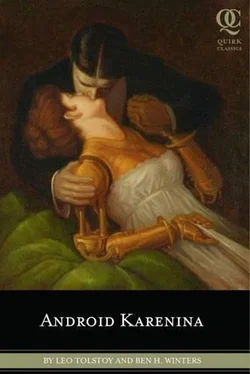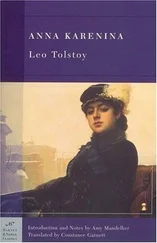“You got my communiqué? Quite well? Thank God.”
“You had a good journey?” said her son, sitting down beside her, and involuntarily listening to a woman’s voice outside the door. He knew it was the voice of the lady he had met at the door.
In the next moment, the mysterious woman and her robot appeared again in the door of the Grav. “Could you see if Stepan Arkadyich Oblonsky is here, and send him to me?” she said politely to a II/Porter/7e62, who scuttled off obligingly. Vronsky understood now that this was Madame Karenina, and this her Class III, Android Karenina.
“Your brother is here,” he said, standing up. “Excuse me, I did not know you, and, indeed, our acquaintance was so slight,” said Vronsky, bowing, “that no doubt you do not remember me.”
“Oh, no,” she said, “I should have known you because your mother and I have been talking, I think, of nothing but you all the way.” As she spoke she let the eagerness that would insist on coming out show itself in her smile. “And still no sign of my brother.”
“Do call him, Alexei,” said the old countess. Vronsky stepped out onto the platform, and shouted, “Oblonsky! Here!” Lupo let out a corresponding howl, long and low.
Madame Karenina, meanwhile, did not wait for her brother, but catching sight of him she stepped out with her light, resolute step. And as soon as her brother had reached her, with a gesture that struck Vronsky by its decision and its grace, she flung her left arm around his neck, drew him rapidly to her, and kissed him warmly. Vronsky gazed, never taking his eyes from her, and smiled; he could not have said why. But recollecting that his mother was waiting for him, he went back again into the carriage.
“She’s very sweet, isn’t she?” said the countess of Madame Karenina. “Her husband put her with me, and I was delighted to have her.” Madame Karenina entered the carriage again to say good-bye to the countess.
“Well, Countess, you have met your son, and I my brother,” she said. “And all my gossip is exhausted. I should have nothing more to tell you.”
“Oh, no,” said the countess, taking her hand. “I could go all around the world with you and never be dull. You are one of those delightful women in whose company it’s sweet to be silent as well as to talk. Now please don’t fret over your son; you can’t expect never to be parted.”
Madame Karenina stood quite still, holding herself very erect, and her eyes were smiling. Vronsky noted with interest how his mother’s beloved-companion, a wiry gray machine-woman called Tunisia, looked distractedly about the carriage during this exchange, while Android Karenina’s careful and attentive posture mimicked that of her mistress precisely.
“Anna Arkadyevna,” the countess was saying to him in explanation, “has a little boy eight years old, I believe, and she has never been parted from him before, and she keeps fretting over leaving him.”
“Yes, the Countess and I have been talking all the time, I of my son and she of hers,” said Madame Karenina, and again a smile lighted up her face, a caressing smile intended for him.
“I am afraid that you must have been dreadfully bored,” he said, promptly catching the ball of coquetry she had flung him. He thrust one leg forward in an offhandedly dashing pose, displaying the hot-whip that flickered in its transparent sheath along the outer curve of his leg. But apparently she did not care to pursue the conversation in that strain, and she turned to the old countess.
“Thank you so much. The time has passed so quickly. Good-bye, Countess.”
“Good-bye, my love,” answered the countess. “Let me kiss your pretty face. I speak plainly, at my age, and I tell you simply that I’ve lost my heart to you.”
Clichéd as the phrase was, Madame Karenina obviously believed it and was delighted by it. She flushed, bent down slightly, and put her cheek to the countess’s lips, drew herself up again, and with the same smile fluttering between her lips and her eyes, she gave her hand to Vronsky. He pressed the little hand she gave him, and was delighted, as though at something special, by the energetic squeeze with which she freely and vigorously shook his hand.
Just as she did, a great BOOM echoed through the Grav station. All present silenced their conversation and paused in their activity-even the industrious II/Porter/7e62s stopped short on their stubby legs and wheeled in small circles, aural sensors pulsing. This BOOM, despite its tremendous power, came from no evident source; it was as if a crack had opened in the sky, through which had come the sound of God pounding his fist upon a table. And though others would later deny it, even scoff at the notion, many present later swore that the sky, at the moment of the blast, flickered an uncanny shade of blackish purple.
Vronsky hastened to calm his mother, patting her hand and saying soothingly, “Koschei, Madame. The 77s captured one and detonated it in the station. Likely this was another.” Vronsky was aware, of course, that this was a well-meaning but preposterous falsehood: the BOOM had sounded nothing like that of the koschei being junkered in the rubbish bin-indeed it sounded like no explosion he had heard in his life, and he had heard many.
Anna Karenina, meanwhile, stared uneasily up at the sky, feeling the reverberations of the BOOM to the pit of her stomach. Only when Android Karenina placed a gentle, reassuring hand at the small of her back could Anna shake off the unpleasant sensation. She then exited with the rapid step which bore her rather fully developed figure with such strange lightness.
“Very charming,” said the countess.
That was just what her son was thinking. Vronsky’s eyes followed her till her graceful figure was out of sight, and then the smile remained on his face. Vronsky saw out of the window how this remarkable woman went up to her brother, put her arm in his, and began telling him something eagerly, obviously something that had nothing to do with him, Vronsky, and at that he felt annoyed.
“Well, Mamma, are you perfectly well?” he said, and gave his mother his arm. But just as they were getting out of the carriage, a small fleet of Class II/StationMaster/44s buzzed officiously past, their alarm lights flashing an urgent red. Obviously something unusual had happened. The crowd who had left the Grav were running back again.
A cold feeling crept over Vronsky, as he caught a whiff of some terrible burning rising off the tracks.
“What?… What?… Where?… Burned?… Crushed! was heard among the crowd. Stepan Arkadyich, with his sister on his arm, turned back. They too looked scared, and stopped at the carriage door to avoid the crowd. Vronsky interposed himself between Madame Karenina and the platform edge, instinctively desiring to block from her vision whatever gruesome scene lay on the magnet bed below.
It was a battered corpse, evidently first fallen on the magnet bed then crushed by the rushing force of the oncoming Grav. The rumor making its way rapidly through the agitated crowd said the dead man had been a stowaway, riding the Grav without a ticket, when he was discovered by a troop of 77s. The heavy-booted machine-men had brought the anonymous rider to their Caretaker, who had demanded his name and occupation. The stowaway had refused to answer and the gold-uniformed Caretaker had dutifully declared him a Janus, a hateful enemy of Mother Russia, and ordered him thrown in front of an arriving Grav.
But Vronsky, who knew that such stories were often mere concoctions to shield the public from some unpalatable truth, retained an agitated feeling about this accident. He averted his eyes from the wrapped, smoldering corpse as the 77s with their strong pipe-like arms tossed it unceremoniously into the back of a carriage.
Читать дальше












